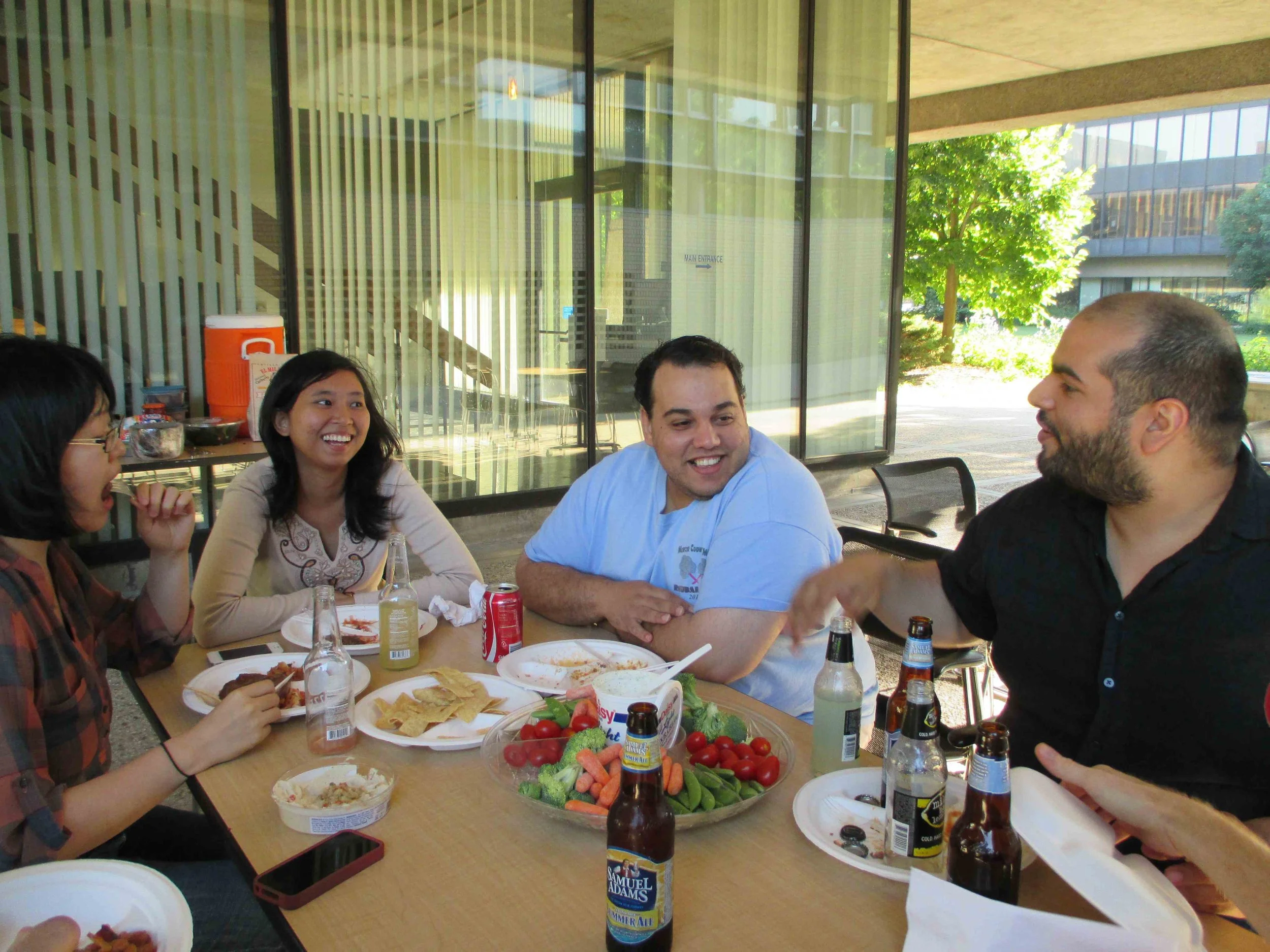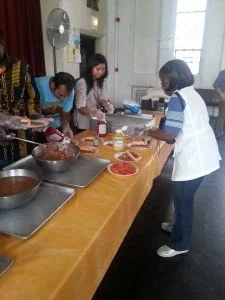Community and Conversations: The Summer Language Program
08-16-2014
One of the legacies that McCormick Theological Seminary is most proud of is that of being a welcoming and supporting educational environment for international students and faculty. The community has welcomed members from Korea, Indonesia, Puerto Rico, Colombia, Burma/Myanmar, India, Egypt, and El Salvador (just to name a few). The Learning Resource and Writing Center (LRWC) is an office that serves both McCormick and neighboring institution the Lutheran School of Theology at Chicago (LSTC) by providing educational support services to international students and by facilitating dialogue across cultures. Every summer, new and returning international students participate in the LRWC’s Summer Language Program, which provides an opportunity to learn about life in Chicago, prepare students for seminary courses, and encourage community-building among domestic and international students.
The 2014 Summer Language Program was a mix of classes, discussions, and field trips to different areas of Chicago. The students were encouraged to bring their own questions about life and education in an American Seminary to the program, and the coordinators tailored the experiences to those requests. Twice a week, the students went to different neighborhoods in Chicago to learn about their histories, their ethnic/cultural composition, and the different issues that affects residents. Summer Language Program participants visited Pilsen, Boystown, Garfield Park, Andersonville, Humboldt Park, Downtown/the Loop, and Roger’s Park. In each neighborhood, they were encouraged to both explore the area on foot and to talk to residents.
“Talking to people on the street improved my confidence in speaking English,” said Godson XXX. Godson first came from India to LSTC as a doctoral student in 2013, and helped coordinate the 2014 Summer Language Program. “These conversations also help me to understand the issues better; I learn a lot.” Godson recounted his experience in Boystown this summer, when he was able to have frank conversations about the experience of being LGBT in the United States, specifically in a relatively safe and affirming neighborhood. “I went to the Center on Halsted and sat in on a support group for elderly LGBT individuals” he said. “Many of them had lost their partners. The way they spoke about their dead partners…many [heterosexual] wives and husbands don’t speak that way. It’s love.”
After every field trip, the students debrief with each other and the LRWC staff and explore the different ideas and understandings that come up for them. “It’s very important to have these kinds of conversations in spaces where everyone shares a similar background,” says Eddie Rosa-Fuentes. Eddie came to Chicago from Puerto Rico in 2013 and volunteered to help organize the 2014 program. “These discussions are important, and many international students are new to these issues. They need a space to discover their thoughts and feelings. The Summer Language Program provides that space.” In the program, international students learn about LGBTQ rights, immigration advocacy, anti-violence efforts, gentrification, health care disparities, the eco-justice movement, race relations, and other issues that have shaped both the United States and Chicago.
Just as important as the actual conversations are the relationships that the international students cultivate during their time in the Summer Language Program. “It’s very difficult, coming from a different country for two years,” says Isabella Novisima. Isabella is a new student at McCormick from Indonesia, and she found the Summer Language Program to be a source not only of knowledge but of new friends. “I always look for family wherever I go,” she said. “Now I have a new family that I know will support me during my studies.” Isabella, and other international students, spend at least 2 years in Chicago, and many are not able to visit home during their time at seminary. The community at the LRWC has been an important source of emotional and spiritual support for students and their families.
Rob Worley, the director of the LRWC, created the Summer Language program to provide an introduction to American culture, a safe space for discussion, a preparation for the particularities of American academia, and a welcome to a supportive community. “The conversations we have at the LRWC don’t happen in other classrooms” Rob says. In addition to the Summer Language Program, Rob organizes two other regular programs that facilitate dialogue and build community in the seminaries. The Learning Partner program pairs domestic and international students for tutoring help. Many international students appreciate the opportunity to have native English speakers help them with their papers and other coursework, and the domestic students enjoy getting to know students from different cultures and contexts. “I learn more from sessions with my learning partner than I do in class discussions,” says Sarah Jones. “My learning partner continually blows my mind with theological insight; editing his papers is a privilege.”
Every Monday, the LRWC hosts a lunch and discussion hour called “Global Conversations.” Students, faculty, staff, and guests present research, experiences, or topics on a variety of global issues. Afterwards, attendees are able to participate in Q&A sessions and learn more about both the speaker and the topic they present. All this is done over a bowl of hot soup and homemade bread. Previous topics include Latin@ LGBTQ identities, educational tours in Palestine, the Presbyterian Colombia Accompaniment Program, and many others. These conversations offer both domestic and international students to learn from each other and to fellowship and converse in a context outside of the classroom.
“The LRWC community has been so important to me during my time at McCormick,” says Vimary Couvertier-Cruz. This sentiment is echoed by many students and alumni, both international and domestic. We look forward to what the LRWC will bring us in 2014-2015! You can join the LRWC for Global Conversations every Monday during the school year, and keep checking the CURE for updates on the international student community and the LRWC’s important work.
The 2014 Summer Language Program
Isabella and Godson serve food at First Presbyterian Church
International graduates show their love for Rob Worley
New international community members Isabella Novsima, Hyunju Lee, Godson XXX and Hakan XXX share a meal after exploring the Pilsen neighborhood






